If there's one thing we've ended up criticising a lot of games for lately, it's having a pretty poor single player mode at the expense of a micro-transaction fuelled multiplayer offering. With more and more developers making increasingly smaller games (only to sell the rest of it as a high priced "season pass" at a later date), it's nice to see there are at least some developers that are willing to stick to the good old fashioned formula - and if there's one word that sums up Torment: Tides of Numenera, it's old fashioned (in a good way!)
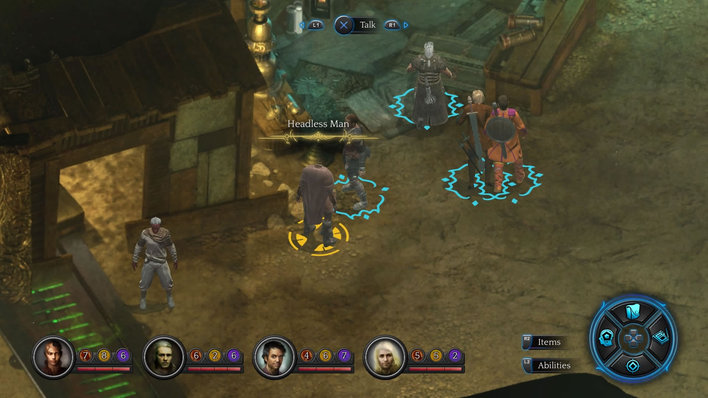
Oh, right. A headless guy. That's completely normal
As an isometric role playing game (RPG), Torment is a game that'll likely make those over a certain age feel a bit warm and fuzzy on the inside from its screenshots alone, as memories of the biggest games of the golden age of role playing games dance around inside your head - like Baldur's Gate, Icewind Dale, and, of course, Planescape: Torment. A spiritual sequel of sorts to the latter, Torment: Tides of Numenera is a daring, and ridiculously ambitious attempt at reintroducing isometric role playing games to consoles, and a game that'll leave your mind boggled.
The story here begins as you fall from an imploding moon, smash through the roof of a building, and finally come to to find a red haired woman and an expressionless warrior standing over you. While the fall would have killed most ordinary men/women, you aren't an ordinary person. In fact, you're not even really a mortal. What you are is a remnant of a being known as the "Changing God" - a person who's discovered both a way to jump from body to body, and the ability to live forever. The only problem is, in jumping from one body to the next when he gets bored, he's ended up leaving a lot of broken bodies behind - one of which is you. Seemingly abandoning you at the moment the moon exploded, you're left to pick up the pieces, and find your way in the world as an immortal husk with some rather fractured memories.

There are some real characters in the world... We wish we could get Quijano to join our party.
However, getting to grips with Torment is a little bit trickier than you'd hope, and not entirely because it's set a billion years in the future. Instead, it's the character creation system that'll leave your head spinning, as not only is it rather in depth, it's also a bit unusual. Rather than showing you anything visual, you'll instead play your way through several purely text based choose-your-own adventure style sections, simply choosing the path you want to take, with your decisions determining the character class the game recommends to you. Once you've completed all three or four sections, you're free to change your class, tweak your stats, and choose your powers however you want, but needless to say, the game throws way too much at you way too quickly with far too little explanation, and it'll leave your head spinning.
Luckily though, the confusion won't last too long, as you soon get chance to set out and explore the initial hub world of Sagus Cliffs, as you begin to find your footing in the game's utterly bizarre universe. Incredibly heavy on reading and dialogue, while being very light on combat, Torment is a game all about the decisions you make - and while a lot of role playing games may make similar noises, in Torment, your decisions really can change almost everything. Characters may live or die, quests may pop up and disappear, and almost every single quest you get can be solved in a number of ways (or even failed). With a tendency for any decisions you do make to come back and bite you in future, whether you're helping a robot workman understand why the children he makes with his own body simply keep dying; deciding whether to help a researcher steal a caged mythical beast; or playing peacemaker with an alien burrowing race that have been digging their tunnels under the city, with devastating consequences; sometimes, failing a quest is actually the better option...

Do you choose to get involved in the strange execution ritual, or stand back and watch an innocent man die?
It's not just the incredible amount of ways you can solve most quests that makes Torment so impressive though - it's the way so many seem to link together. Choices you make in one quest often seem to have a knock on effect on another, with some pretty significant consequences for everyone involved. While the initial hub only has around five main areas you can wander round, its compact nature means the characters you meet will often pop up again where you least expect them.
Take the case of poor old Piquo, a mutant who lives in Cliff's Edge, and has spent most of his young life saving up his money in the hopes of undergoing surgery to make him more "normal". The only problem is, he's not sure how. A strange old lady known as Mother Temaz - a midwife who maintains a close connection with everyone she's birthed through her magic pearls - has sensed there's something on young Piquo's mind, and sends you to investigate. Tracking him down in front of the Chiurgical House (or, surgical, to use a better word), you find Piquo thumbing through his money, but completely unsure of how to spend it. Seemingly trusting the advice of a complete stranger, you can encourage him to either get bigger muscles fitted, get cosmetic surgery on his face, or tell him to keep his money, and try to feel a bit happier in his own skin.
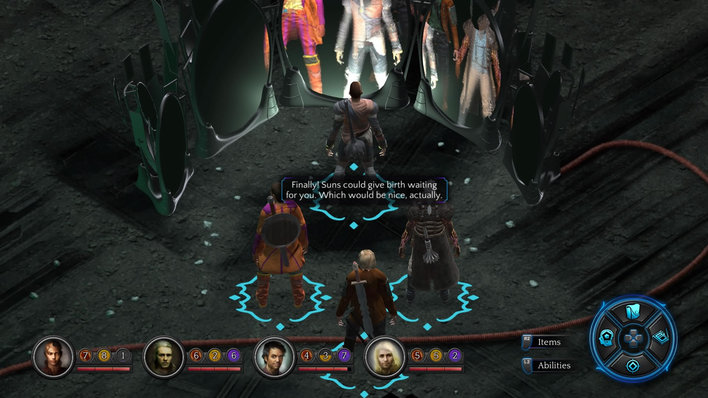
With so many options, no wonder it takes the Changing God a long time to get ready on a Saturday night...
Where the quest goes from here will depend on your actions. If you rest once too often, Mother Temaz's house will collapse into the sea, rendering the quest unsolvable, so you don't want to do that if you can help it. If you're like us, you'll be hunting for yet more quests to try your luck at, and so we headed into the Underbelly - the city's equivalent of its underworld, where its criminals and outcasts reside. There you'll meet Crooked Qeek, a similar mutant with an equally terrible sob story, who's doing what she can to keep her chin up in pressing times. With a fishing rod set up, she isn't have too much luck catching anything, and is essentially starting to starve to death - but you, being the speedy fellow you can, can give her a helping hand. Catch a fish, and chat some more, and you'll learn that Crooked Qeek is the last of her tribe, with everyone else having left much earlier. The one she misses the most, however, is none other than Piquo, who grew up alongside her.
Wonder around the Underbelly a bit more, and you'll discover there's been a murder. With blood strewn across the floor, and a veritable smorgasbord of ne'er-do-wells around every corner, they need your help to try and solve it. Making matters more complicated is that there's a cult of cannibals, the Dendra O'Hur who live in the Underbelly too - a cult who chew up the dead in order to "absorb their memories", making them kind of like a human compost. It stands to reason that one of them is responsible - but it's up to you to figure out who.
It's here where the quest starts to branch. If you can interview the Denra O'Hur, check out their alibis, and look for any clues without having to rest, you'll be OK. But as soon as you rest, another murder will occur - and every time you rest from thereon in, another person will die. The first unlucky victim? Poor old Crooked Qeek. But luckily, there's a way to stop it. Having learnt the two are childhood friends, you can actually head back to Piquo first, and persuade him to return to the underbelly, to look after Qeek. If he's there, he'll save her life - if he's not, she'll the next victim.
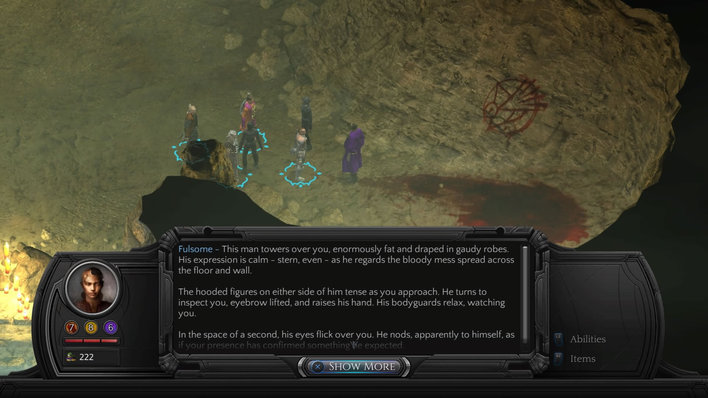
Will you stop the murderer before they kill again?
And that's just one example of the way so many quests, characters, and decisions you make interplay with each other. While most other role playing games manage one or two big decision making moments, the story in Torment changes with almost every choice you make - with far reaching, life and death consequences for its residents. Needless to say, it's enough to make even the most carefree player a conscientious saver (thank God it has a quick save option) - and you'll want to keep playing, and keep talking, just to see what happens next.
The vast majority of quests, and tricky situations you find yourself in can be resolved verbally, making use of what the game calls "Effort". Each character, depending on their class, will have access to three pools of points - Might, Speed and Intelligence - which you can use to your advantage during conversation. Through choosing specific dialogue options, you can intimidate, persuade, or deceive your opponents, using your sheer force of personality to talk them into doing whatever you want them to do. However, these choices aren't 100% guaranteed to work - and that's where the Effort pools come in. If you choose one of the persuasion options, the game will show you a bar, which tells you how likely your verbal sleight is to work, and lets you spend points from your pools of Effort to influence its likelihood. Depending on your class and stats, you'll be able to spend different amounts of points, with certain characters being better at intimidation than speed related tasks, for example - and if you play your cards right, you can avoid the vast majority of combat. However, points can only be restored by either using an item, or resting - which is why solving the murder case in one sitting isn't all that easy.
Even without the combat avoidance dialogue options, though, combat is infrequent in Torment, and that's perhaps putting it lightly. In our first 20 hours with the game, we've had a grand total of three battles - but that's not to say they aren't any good. Perhaps unusually, the combat here is turn based, with you and your opponents taking it in turns to both move, and attack. Each character can move a certain distance, and then choose to either attack, or use an item, with your moves using a similar percentage-chance system to the dialogue options. Different types of attack draw from different pools of Effort, with some even drawing from the same pools as the dialogue options - which can have some interesting side effects. If you end up in combat after having tried to weasel your way through a lengthy piece of dialogue, you'll find yourself soon running out of points you can spend, making your attacks weaker, and much less likely to hit. Still, for the most part combat is fun, if ever so slightly complex.
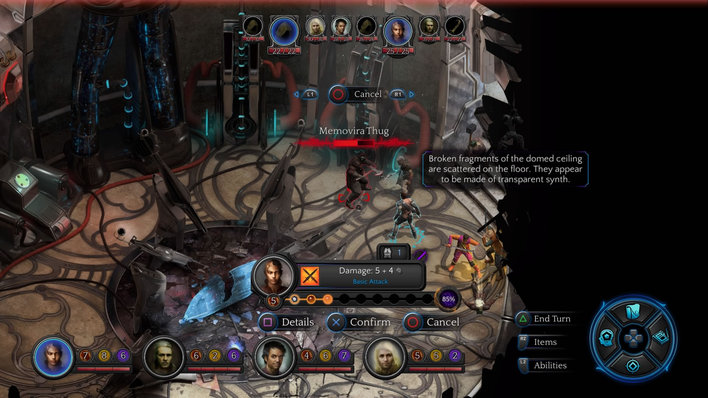
As they're turn based, you'll have plenty of time to think through your options.
However, despite its incredible scope, Torment: Tides of Numenera does have some problems - and unfortunately, they're pretty big ones. One of the most obvious is the poor performance. While we're incredibly happy to see a role playing game like this reach consoles, Torment gets really juddery at times, with a frame rate that goes beyond choppy when you're in a large city. We're not really sure why, either - by all accounts, all the game's doing is moving around a handful of 3D character models, and a large, pre-rendered background, which shouldn't be quite as stressful on the console as it seems to be. The developers do deserve bonus points for making sure the main text is all perfectly legible when you're a reasonable distance away from a TV though - especially seeing as so many other developers seem to not even really bother checking.
More worrying, however, is that Torment far too often strays into the realm of "literary fiction". For one reason or another, the game has a nasty tendency to pepper its dialogue with really unusual words - words that, after a quick straw poll, no-one at Everybody Plays could reliably say what most of them meant. Maybe we're just a bit thick, but it seems more likely to us that one of the writers decided to use the game as an excuse to flex their literary muscles and show off their vocabulary - with the side effect being that you'll feel like you need to sit with a dictionary next to you to figure out what exact it is the characters are saying.
But don't take our word for it - try it yourself. Without Googling, can you tell us what antediluvian, alacrity, sonorous, stentorian, autochthonous, importunate, docent, columbarium, probity, logothete, scriveners, lissome, scion, aquiline, tenebrous, or libations mean? And it's not just the language either. Sometimes, characters speak in such intricately poetic metaphors, you have literally no idea what they're actually trying to say. Never mind the fact that few people tend to reel off a veritable novella when asked a simple question - often the language, and the way the game's written only serves to make it harder to follow, in turn making it trickier for you to get invested in the plot, and the characters. It's the sort of thing that probably should have been edited out of the game after the first draft, but with 1.2 million words making up the script, perhaps it's something that just got missed.
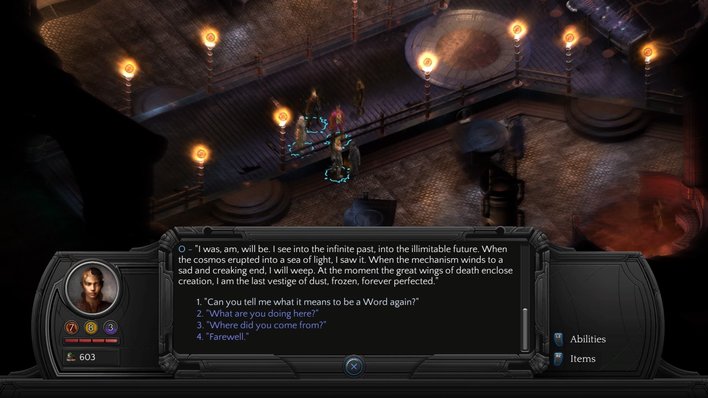
Right... What?
The other unusual thing is how the game always starts a dialogue section by giving you a textual description of the character you're talking to. At times it can work well, pointing out details the game isn't able to show you, but at other times it just comes across oddly - especially when the descriptions the game gives you don't match what the character's doing in game. Things would all flow a little bit easier if there was more emphasis on showing, and less on telling.
Still, despite the flaws (and hopefully, the performance issues at least can be patched), if you like story driven games, if you have an interest in role playing games, and you don't think you'll be too intimidated by a world where so many decisions you make can come back and bite you (or benefit you) later down the line, Torment: Tides of Numenera is well worth picking up. The rebirth of a genre we'd long thought forgotten, we'll be keeping our fingers crossed this sparks a renaissance of RPGs - especially as you'd imagine an isometric RPG is cheaper to put together than a fully 3D epic, yet this is every bit as much fun to play. Incredibly ambitious, with insane amounts of scope, Torment is like the choose your own adventure novel of your dreams. Delve in, and start making your choices.
Format Reviewed: Playstation 4


















